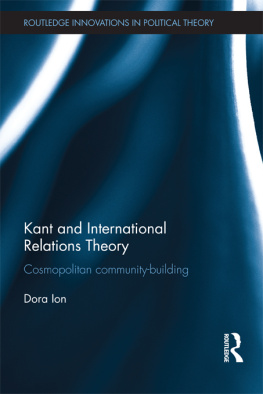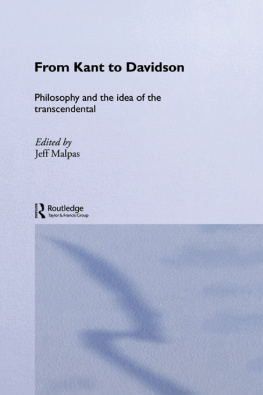Peter Szendy
Kant in the Land of Extraterrestrials
Cosmopolitical Philosofictions
Translated by Will Bishop
Fordham University Press
New York
2013
Copyright 2013 Fordham University Press
All rights reserved. No part of this publication may be reproduced, stored in a retrieval system, or transmitted in any form or by any meanselectronic, mechanical, photocopy, recording, or any otherexcept for brief quotations in printed reviews, without the prior permission of the publisher.
This work was originally published in French as Peter Szendy, Kant chez les extraterrestres: Philosofictions cosmopolitiques 2011 Les Editions de Minuit.
Ouvrage publi avec le concours du Ministre franais charg de la CultureCentre National du Livre.
This work has been published with the assistance of the French Ministry of CultureNational Center for the Book.
Cet ouvrage a bnefici du soutien des Programms daide la publication de lInstitut Franais.
This work, published as part of a program of aid for publication, received support from the Institut Franais.
Fordham University Press has no responsibility for the persistence or accuracy of URLs for external or third-party Internet websites referred to in this publication and does not guarantee that any content on such websites is, or will remain, accurate or appropriate.
Fordham University Press also publishes its books in a variety of electronic formats. Some content that appears in print may not be available in electronic books.
Library of Congress Cataloging-in-Publication Data
Szendy, Peter.
[Kant chez les extraterrestres. English]
Kant in the land of extraterrestrials : cosmopolitical philosofictions / Peter Szendy ; translated by Will Bishop. First edition.
pages cm
Includes bibliographical references.
ISBN 978-0-8232-5549-8 (cloth : alk. paper) ISBN 978-0-8232-5550-4 (pbk. : alk. paper)
1. Kant, Immanuel, 17241804. 2. Cosmopolitanism. 3. Science fictionPhilosophy. I. Title.
B2799.C82S9413 2013
193dc23
2013015250
Printed in the United States of America
15 14 13 5 4 3 2 1
First edition
ginak
(il y a dans notre imagination
un effort pour progresser vers l'infini)
s Karcsinak
(s megmutatta mesebeli kincst/
az szi gbolton a tiszta holdat)
Contents
Can you imagine us taking a vacation on the moon?
Can you see us going not to those ever so fond and familiar places, the ones we keep going to every year, or to one of those terrestrial lands we have long since promised ourselves wed visit, but to an entirely different elsewhere marked by a weightlessness that, for a few memorable days or weeks, would turn us into veritable cosmopolitanscitizens of the cosmos?
We can dream about this cosmic exoticism. We can do so all the more inconsequentially given that this vacation would last a limited amount of time and be an utterly provisional abandonment of our terrestrial anchoring with the perfect assurance of our return. A tourist, as is well known, is neither an explorer nor a discoverer. Wherever a tourist goes, the road is already paved; others have gone down it before him; and still others will take it after him.
Today, this spatial tourism has become a very serious possibility. A few billionaires have actually already been able to buy themselves a trip into extraterrestrial space. The transporters that propel them beyond our planet are often businesses that were built on the final ruins of the worlds bipartition between capitalism and communism: The sorry economic state of the Soviet space station Mir led to the foundation of MirCorp, a commercial company that had promised to send the first extra-earthly tourist into space, the American businessman Dennis Tito. (After various difficulties, it was ultimately the company Space Adventures that did so in April 2001, the same company that is currently developing the possibility of going around the moon on the space shuttle Soyouz for a hundred million dollars.) For the moment, only several other happy few have been able to take this path, but people are already talking of the democratization of these trips beyond our globe.
How many of us will soon be seeking leisure in a hotel sent into orbit? Some, like Robert Bigelow, an American hotel magnate and founder of the Bigelow Aerospace company, have already bought NASAs trademarks for inflatable housing tested in space. Our planet is thus also swelling, expanding beyond its sphere and its atmosphere toward an outside from which it can also look at itself.
What could be more beautiful, what more sublime, it has been said, than the Earth seen from the sky?
Even though we recently celebrated the fortieth anniversary of the space mission Apollo 11, the famous words of its captain, Neil Armstrong, seem to have become outdated: Thats one small step for a man, one giant leap for mankind, he declared when he placed a foot on lunar ground on July 21, 1969. I was three years old at the time and have no memory whatsoever of having attended the broadcast of this giant little step. A tiny and nonetheless immense if hesitant stride that is now probably destined to be repeated: Following in the footsteps of the first man to walk on the moon is a gesture that will little by little become possible for countless space tourists.
During their visit, they may well pause, with an emotion appropriate to the circumstances, in front of the plaque that the pathbreaking pioneers left on the moon, decorated with the following sentences: Here Men from the Planet Earth First Set Foot upon the Moon, July 1969 a.d. We Came in Peace for All Mankind. Perhapswho knows?these extra-earthly tourists will also have the opportunity to see enlarged versions of the innumerable goodwill messages engraved in miniature on a silicon disc, whichit too left in deposit on the lunar starstill bears the expression of the pacifist intentions of the heads of state from seventy-three earthly countriesamong whom figure, haphazardly, the Romanian dictator Nicolae Ceauescu, the president of Senegal Lopold Sdar Senghor, and Pope Paul VI, prefaced in a way by the declarations of four American presidents. Lyndon B. Johnsons is perhaps the most emblematic: Space shall be an avenue toward peace.
How will these interplanetary tourists still to come understand words such as peace or mankind? How will they read these concepts that our predecessors in weightlessness made it a point to engrave into the threshold of the unknown, to leave on what was then the ultimate frontier?
Peace, humankind: These words, or these conceptsas we will see with two major thinkers of the limit, Immanuel Kant and Carl Schmittactually border on one another. According to Kant, peace, the true peace that would therefore not be merely a truce between two wars, perpetual peace is in effect a regulating ideal that only recedes further out onto the horizon as you think you approach it, as if it could only be thought at the limit.
Humanity, peace: two concepts that refer to each other even as they are constantly sent further away, beyond any existent border. Is their definition or delimitation to be sought beyond their constantly retreating threshold, in the infinite opening of extra-earthliness?
It is this cosmopolitics just beyond the horizon that we will be attempting to outline in the following chapters, allowing ourselves by inscribing in the cosmos a radical alterity that we will then have to think anew, as a result, on Earth.













